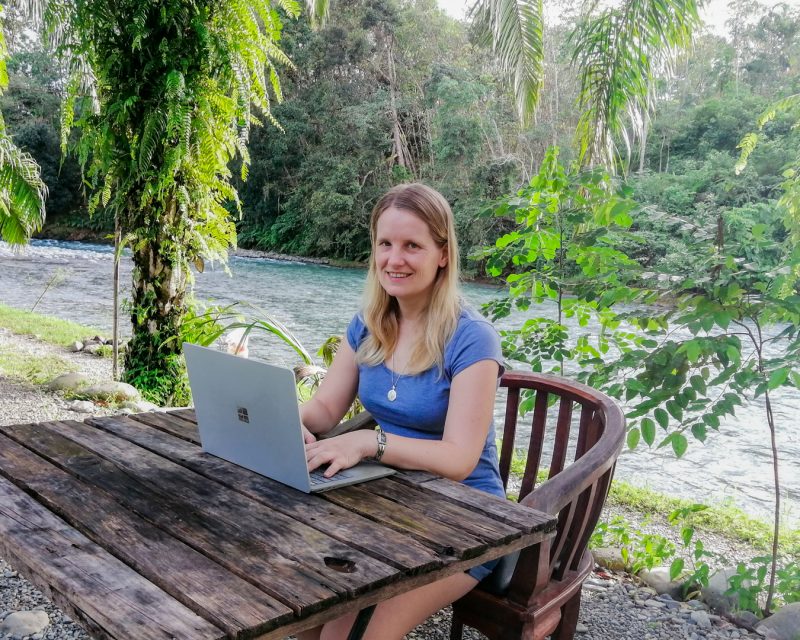Working remotely is the best decision I have made in the last couple of years.
It gives me the freedom to go and stay wherever I want. The only thing I need is a laptop and a good internet connection. No more hoping for some sunshine in the middle of January to make the gloomy and short days just that little bit more bearable. Instead, chasing the sun all year round. I am writing this article in the middle of January, sitting next to the river and the jungle in a ray of sunshine.
Why is it so important to really know what you want?
Although I said I can go wherever I want, there are some limitations depending on the job that you are doing and the company you are working for. And some of these limitations are caused by different time zones. I am writing this article at the weekend since I can do this perfectly asynchronous. But being Growth and Customer Success Manager at Beelance, I have to be there for our clients. This means I have to work a lot synchronously thus Belgian office hours in Indonesia. During the week, I work from 3 pm until 12 am.
This is of course something I considered before starting at Beelance and before going to Indonesia. When I am looking for remote work or projects, I consider 2 options. Either it needs to be a project that can be done asynchronously so I can do it in my own time. Or it needs to be a project with the offices in Europe.
Why? When I am in Belgium or Europe, I like to work from 9 to 6. I love to have the evenings to see my friends and family. All the people I know there are working these hours, so it makes much more sense. But when I am in Asia, I love to sleep in, take my time to eat breakfast, and slowly start the day. I have the chance to maybe explore some places where I am living before starting to work. So European office hours are perfectly fit to my needs.
I have met a guy who is a digital nomad in Asia and likes to work during the evenings and nights. He wants the days to be free so he can explore the country and place he is living in at the moment. That’s why he only applies for work at American companies.
How to choose your company?
There are companies that expect their employees or freelancers to be available for only two or four overlapping hours instead of eight. They ask for a few hours so you can have meetings with your colleagues. They want to be sure that there is enough possibility to communicate properly. Many remote companies try to make the communications as asynchronous as possible. There are still things that need to be discussed synchronously. Sometimes it is too complicated to explain or too sensitive to do it over email. Some remote companies have completely flexible hours as long as you can adequately communicate with your colleagues and get the job done.
Four things you need to think about before you apply for a remote job:
Working in different time zones is perfectly possible, but there are a few things to consider before you apply for a project.
- First of all, does your job need real-time presence or can it be done in your own time? I already mentioned this, it speaks for itself.
- Second, what kind of hours are you willing to work? When would be the best time for you to work? Are you a morning or an evening person? Or even a night person? Or does it depend on the situation like mine? This has an impact on the countries you can apply in and the countries you can go to once you have a remote job or project. Both are related to each other. If you want to work for a European company, it limits the places you can go to. If you want to stay and travel in America, it limits the countries you can apply in. I would for example not go to America when working for Beelance. I would reserve these countries for my vacation days. It would otherwise mean that I have to get up early in the morning, when it is still dark, to be there for our clients. And I think you already understand that I am really not a morning person. Or, I would have to get up in the middle of the night for a meeting. You can do this for a few times, but when it is consistent, you won’t get enough sleep and jeopardize your health.
-
Third, what is the culture of the company and what do they expect? How much overlap do they need, how flexible are your hours? Based on these considerations, you can maybe broaden the array of countries you want to apply in and for which companies you want to work for. Or you have more flexibility in the countries you can visit.
- Fourth, you of course also have to consider the length of the project you will be working at.
Working remotely opens so many possibilities, you truly get to work where you can be the most productive. You can explore new countries and cultures, work together with people from all around the world and broaden your vision. It really enriches your life. As long as you consider the time zones beforehand so you don’t get stressed, overworked or exhausted because of not enough sleep. A good research about the company and good preparation is key to having a worried-free digital nomadic lifestyle.
 Back to posts
Back to posts


